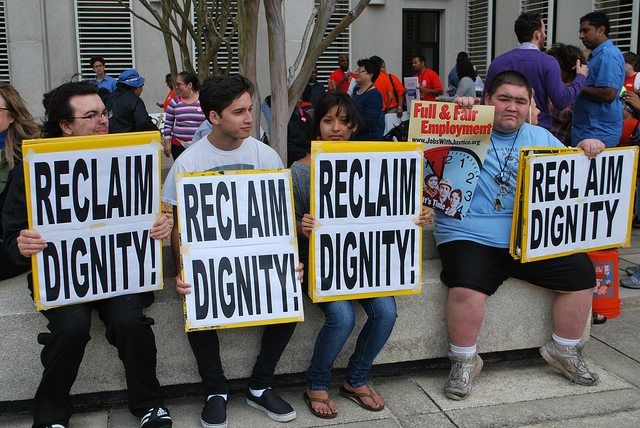
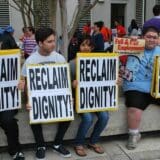
Analysis of swing-state voting in last week’s election demonstrates that the massive on-the-ground mobilization of union members and volunteers directly aided Obama and other pro-labor candidates in carrying Ohio, Nevada and Wisconsin. Unions prevailed in beating back anti-labor legislation in California and Wisconsin, and succeeded in three separate living wage campaigns.
On the national level, will labor remain vigilant and hold Obama and other newly elected Democrats accountable to workers? AFL-CIO President Richard Trumka vows that this will be the case.
In an interview with Salon, Trumka is quoted as saying:
“One thing that we’re doing different than we’ve ever done before … is we’re not dismantling our program today.” Instead, he promised, it will move “from electoral politics to advocacy, and from advocacy to accountability.”
As an example of the continuing momentum for labor advocates, Trumka points to Ohio, where “AFL-CIO members are 83 percent white.
» Read more about: Victorious Labor: Celebrations Before the Storm? »
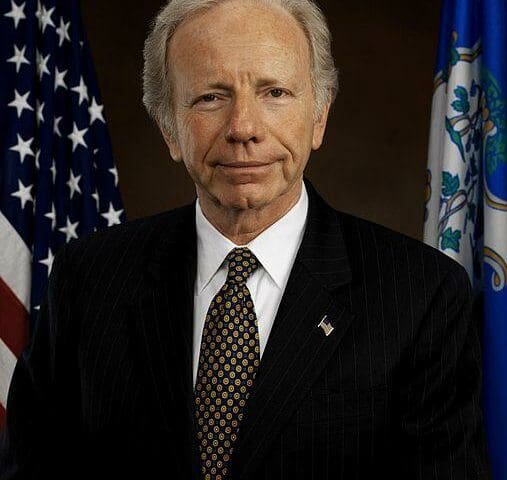
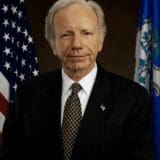
Other than voting for Obamacare, Joe Lieberman has done little good for the nation or the Senate since his petulant run as an Independent six years ago after Connecticut Democrats booted him out of the party.
Now that he is heading out the Senate door – finally – Lieberman is firing a parting “F— You!” shot at the country. It’s a little-noticed piece of legislation he is trying to move through his Committee on Homeland Security and Governmental Affairs — a bill that would effectively strip independent regulatory agencies of their power to effectively regulate just about anything.
Without holding a single hearing, Lieberman’s committee wants to pass the “Independent Agency Regulatory Analysis Act of 2012,” which strips the independence from a raft of federal agencies: Everything from the Securities and Exchange Commission to the Nuclear Regulatory Agency and National Labor Relations Board.
Among its many provisions, the law would require each of the agencies that Congress quite deliberately established as independent to submit all proposed rules to the White House for “vetting” before they could be published.
» Read more about: Joe Lieberman Bill Would Hobble Regulatory Agencies »


Over the last couple of years, I’ve blogged about waste reform in the City of Los Angeles. Following is a summary of where we are with the proposed waste reform so folks just tuning in, and those who have followed the twists and turns, have one central place for background as our the city council takes up this important issue in the coming weeks.
Disposal of waste is perhaps one of the most pressing environmental issues the City of Los Angeles faces. Los Angeles sends approximately three million tons of trash per year to landfills. This practice exacts a large environmental toll. The City has already promised to become a zero waste City by 2030. This entails interim goals of achieving 70 percent diversion from landfills by 2013 and 90 percent by 2025.
L.A.’s commercial and multi-family sectors are responsible for approximately 70 percent of the waste the City of Los Angeles send to landfills,
» Read more about: Transforming L.A.'s Trash Collection for the Next 50 Years »


 Remember the spring and summer of 2011, when the Los Angeles Alliance for a New Economy (LAANE) was mysteriously tracked by MB Public Affairs? Beginning in May, 2011, this right-wing “political ops firm,” led by Karl Rove operative Mark Bogetich, launched a massive investigation into LAANE, requesting thousands of documents from virtually every elected or appointed official in L.A. County. With lots of public support, LAANE fought back and, after several months of press releases, petitions, blog posts and other “reveal thyself” exhortations to MB’s secret funder, the inquiry suddenly stopped. According to City Hall insiders at the time, MB’s requested documents were left uncollected and LAANE activists and supporters were left wondering who would possibly have wanted to spend an estimated $50,000 to find dirt on a nonprofit advocacy group that makes no secret about what it stands for.
Remember the spring and summer of 2011, when the Los Angeles Alliance for a New Economy (LAANE) was mysteriously tracked by MB Public Affairs? Beginning in May, 2011, this right-wing “political ops firm,” led by Karl Rove operative Mark Bogetich, launched a massive investigation into LAANE, requesting thousands of documents from virtually every elected or appointed official in L.A. County. With lots of public support, LAANE fought back and, after several months of press releases, petitions, blog posts and other “reveal thyself” exhortations to MB’s secret funder, the inquiry suddenly stopped. According to City Hall insiders at the time, MB’s requested documents were left uncollected and LAANE activists and supporters were left wondering who would possibly have wanted to spend an estimated $50,000 to find dirt on a nonprofit advocacy group that makes no secret about what it stands for.
Over the past year, the mystery of the secret investigation has continued to puzzle us.
» Read more about: Who Was Behind the Secret Investigation of LAANE? »
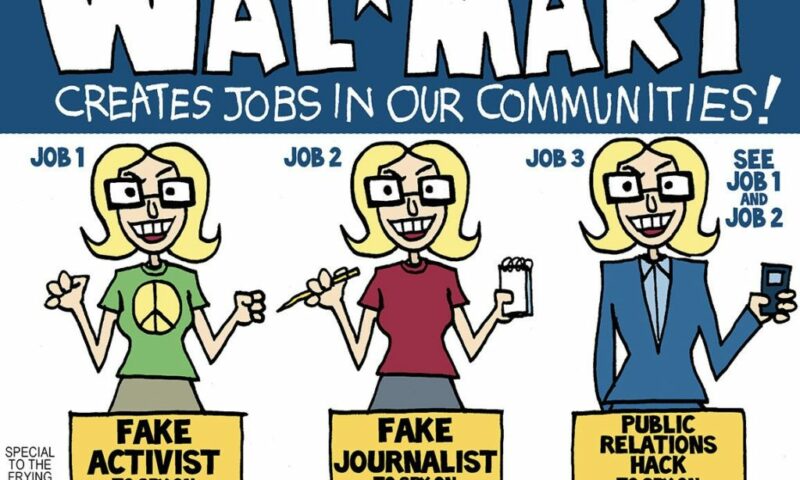
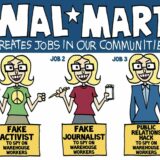
» Read more about: Lalo Alcaraz on Walmart’s Fakes and Hacks »
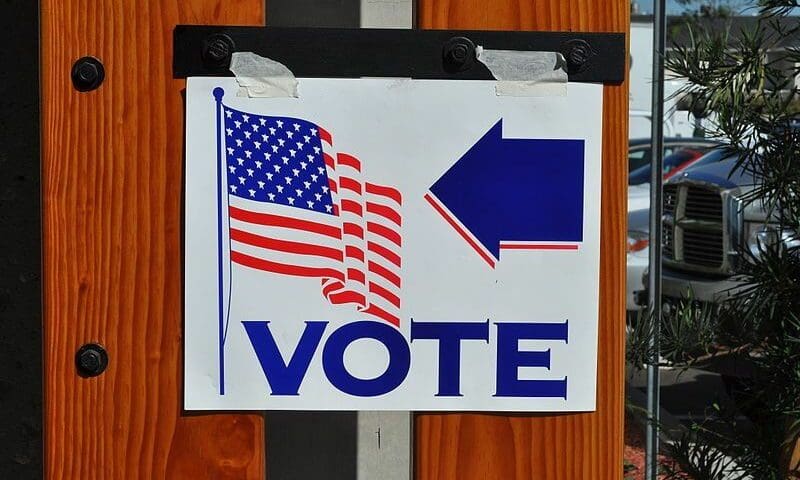
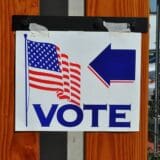
My mail delivery guy just got happier. He can finish his route while it is still light outside – this despite the change back from daylight savings time. Now he gets his work done in daylight: With the election over, he has less junk to deliver.
I don’t know how it was in your neighborhood, but in my apartment building the stuff filled the box every day for a month, and in the last week, so much mail rolled in that it couldn’t fit anymore. So my mail carrier patiently sorted it into clumps and placed it in the magazine space at the bottom of the mailbox area.
As far as I can tell, the vast majority of these ads went untouched, unless some conscientious soul threw them directly from the mail box into the recycling crate across the hallway. In any case, a couple of million dollars-worth of campaign mail wasn’t read,
» Read more about: Election Campaigning: Walking the Walk, Tossing the Ads »
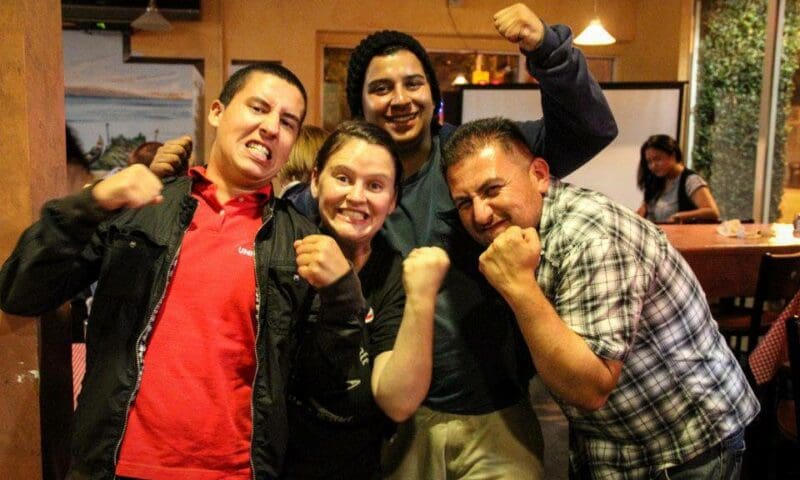

Two thousand workers who clean the rooms and serve the food at hotels in Long Beach, California had special cause for celebration election night. They will finally earn a living wage and be able take a sick day without risking a paycheck or a job.
“I have said all along that the second thing I would do when Measure N passes is take my family off of public assistance,” said Maria Patlan, a 10-year housekeeper in Long Beach’s hotel industry. “But the first thing I will do is a dance of joy.”
Maria and scores of workers like her helped lead the diverse Long Beach coalition that organized for months to pass the ballot initiative that became known as Measure N. It establishes a minimum wage of $13/hr (about $2,000 a month) in Long Beach’s hotels employing 100 or more, guarantees workers can earn five sick days a year and protects their tips.
» Read more about: Long Beach Hotel Workers Win Living Wages, Paid Sick Days »
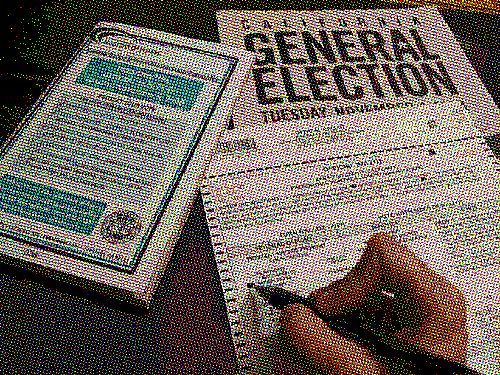
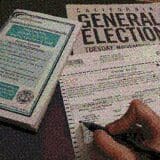
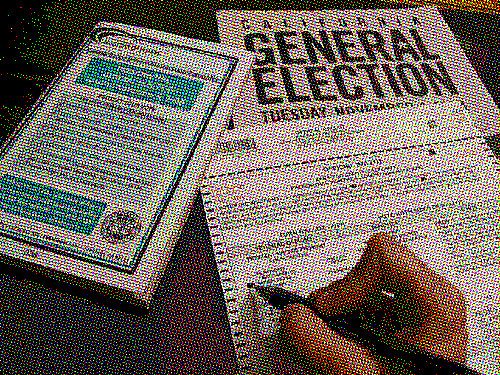 Frying Pan News spoke to five voters the morning after Election Day to hear their initial reactions to the outcome. Here’s what they told us:
Frying Pan News spoke to five voters the morning after Election Day to hear their initial reactions to the outcome. Here’s what they told us:
Jonathan Parfrey wears several hats: executive director of Climate Resolve, president of the Los Angeles League of Conservation Voters and a commissioner at the L.A. Department of Water and Power. Election Day morning found him up early gathering climate-change documents in advance of a public DWP hearing. He remained unfazed by volatile election scenarios painted by pundits.
“I relied heavily on Nate Silver as my online therapist,” Parfrey said. “He kept fixing my head so I could function.” (Silver’s dry polling metrics, carried in his New York Times blog FiveThirtyEight, consistently predicted the presidential race to be a walk-off for Obama.)
Parfrey would vote that day at the L.A. Job Corps Center on Broadway.
“The volunteers were under 87 years old!” he marveled.
» Read more about: Election 2012: Five Personal Reflections »
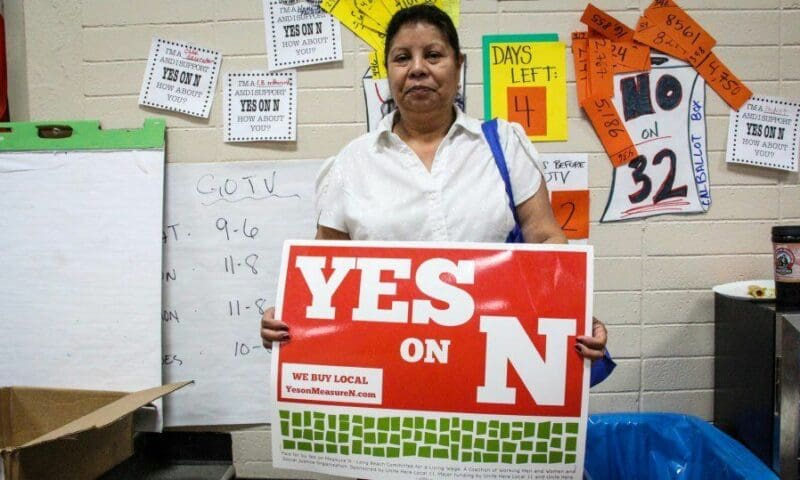

Something extraordinary happened Tuesday in Long Beach. A city long dominated by an ideologically driven business sector and marked by token community participation, embraced a living wage measure. With a resounding 63 percent of the voters in favor of Measure N, we can clearly state that the Long Beach community stood in favor of fairness and justice November 6. From a practical perspective it means lifting 2,000 Long Beach workers above the poverty line, perhaps a two-bedroom apartment for a family of four, or the “luxury” of taking a paid day off to attend to a sick child or relative. It also lays the foundation for renewed economic growth by providing additional income that will be recycled through the Long Beach economy.
How did this happen in a city controlled by business interests who said a living wage should not, could not and would not pass? By acknowledging four things:
» Read more about: Election 2012: The Battle for Living Wages in Long Beach »
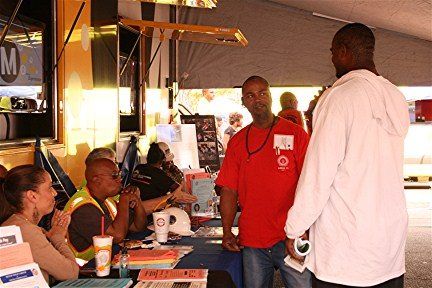

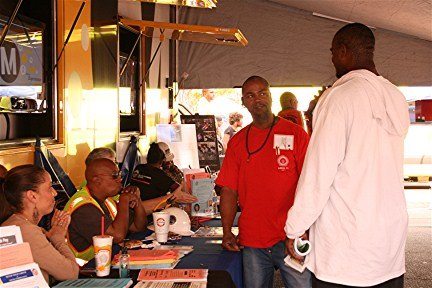 The annual Taste of Soul Festival is renowned for its culinary offerings and cultural richness. This year’s festival, however, had something else on the menu: real hope for job seekers.
The annual Taste of Soul Festival is renowned for its culinary offerings and cultural richness. This year’s festival, however, had something else on the menu: real hope for job seekers.
The promise of employment comes from the groundbreaking Construction Careers policy passed by the Metropolitan Transit Authority (MTA). Metro became the first transit agency in the country to ensure that projects are completed using skilled workers and creating training opportunities for economically disadvantaged residents. Since then, the Construction Careers coalition – an alliance of worksource centers, youth-engagement and veterans groups, and community groups – has embarked on an ambitious effort to reach out to as many communities as possible about opportunities in the construction industry, in advance of groundbreaking on major projects that will be covered by the policy, including the Crenshaw/LAX line, the Westside Subway Extension and the Regional Connector. This sort of outreach is crucial as South L.A.
» Read more about: A Taste of Soul With a Side of Construction Careers »


 Three decades ago, women in South Los Angeles stood up against the City of Los Angeles to block the siting of the city’s solid waste incinerator known as the Los Angeles City Energy Recovery (LANCER) project. Organized as the Concerned Citizens of South Central Los Angeles, women successfully fought back against powerful industry and business interests and complicit local decision makers, to block an additional polluting facility from being sited in a neighborhood already bearing the burden of toxic waste and abandoned factories.
Three decades ago, women in South Los Angeles stood up against the City of Los Angeles to block the siting of the city’s solid waste incinerator known as the Los Angeles City Energy Recovery (LANCER) project. Organized as the Concerned Citizens of South Central Los Angeles, women successfully fought back against powerful industry and business interests and complicit local decision makers, to block an additional polluting facility from being sited in a neighborhood already bearing the burden of toxic waste and abandoned factories.
While communities across the U.S. began organizing around environmental justice, powerful waste industry interests continued their expansion, while avoiding increased opposition to incineration plants and waste plants in general. The California Waste Management Board retained Los Angeles-based lobbying firm Cerrell Associates to produce a memo outlining which communities were least likely to oppose waste incinerators. The memo, titled “Political Difficulties Facing Waste-to-Energy Conversion Plant Siting.” (aka the “Cerrell Memo”) presented a demographic analysis identifying low-income communities of color,
» Read more about: L.A.'s Environmental Justice and Waste History Lesson »
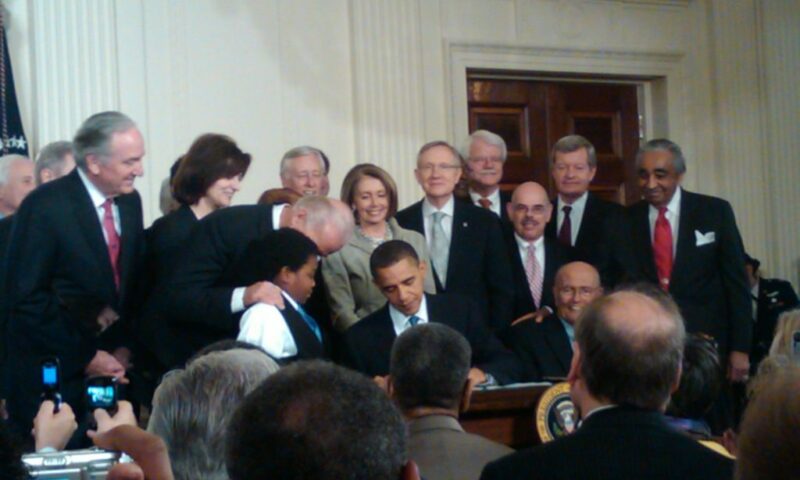
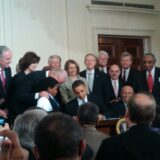
Four years ago, my wife and I planted an oak tree on Election Day – our Obama Oak – at the front of our house. The remarkable thing about the tree is how long it holds on to its leaves. I see it from my window, now doubled in height, still holding its crimson leaves, even after Sandy’s winds blew the leaves off of every other tree in the surrounding Taconic Hills. For me, the Obama Oak’s hardiness is a testament to perseverance of a health reform movement and a president, who together completed the 100-year quest to make health care a government-guaranteed right in the United States. With the president’s reelection, that quest is now secure and a new era in American health care begins.
I am sure that skeptics on the left will scoff at the assertion that the ACA launches a new era in health care. After all, a key to securing congressional passage of the Affordable Care Act was that the law did not upend the current system of health care financing in the United States.

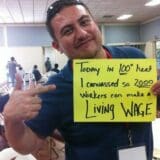
Long Beach hotel workers and community activists made history Tuesday, passing a living wage ballot measure that will help lift 2,000 people in that city’s tourism industry out of poverty.
Long Beach was one of three cities nationwide that passed minimum wage measures (San Jose and Albuquerque were the others), and the only one that enacted a law with paid sick leave. Workers at Long Beach’s large hotels will now earn at least $13 per hour and will have five paid sick days a year.
The passage of Measure N is the culmination of a multi-year effort by LAANE, UNITE HERE! (the union representing tourism industry workers) and the Long Beach Coalition for Good Jobs and a Healthy Community to build grassroots power in Long Beach, a city that for decades has been dominated by business interests largely disinterested in the huge numbers of working poor. Beginning with a large-scale civic engagement project,
» Read more about: Election 2012: Huge Election Win for Long Beach Hotel Workers »


For me, especially once Mitt Romney named Paul Ryan as his running mate, the presidential race became a contest between two Americas: one traditional, Christian, white and wealthy; the other was, well, the Other — a pioneering America of varied ethnicities, incomes and spiritual traditions. The Rainbow Coalition that Jesse Jackson first named a generation ago has come to fruition and it’s a bright day for America. Obama garnered 70 percent of the Latino vote, 70 percent of the Asian vote, 93 of the black vote, 73 percent of the gay vote and close to 60 percent of the female vote. We once again proved that this country is always changing, and that change is our strength.
Obama’s victory is thus history’s victory, the people’s victory, and a victory for all those who believe we succeed best and most when we work together across the so-called “lines” that tradition and history have often put between people.
» Read more about: Election 2012: Diversity Takes Center Stage »
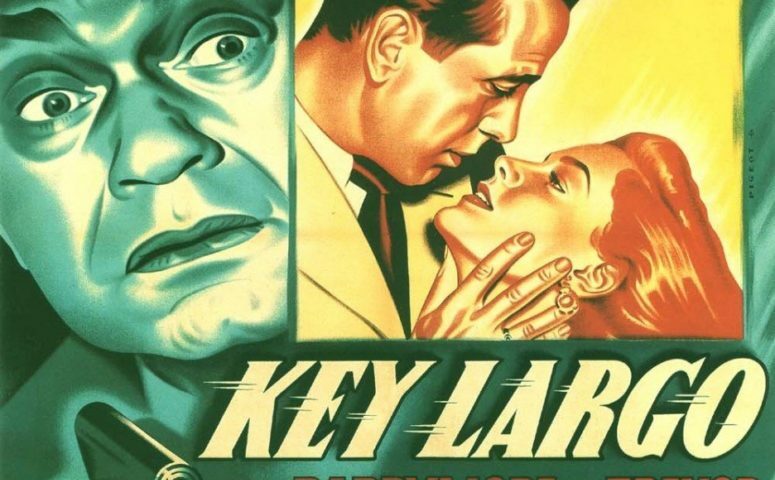

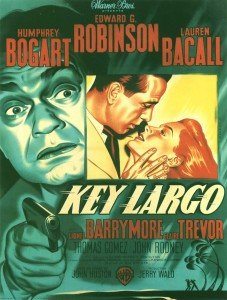 When asked by prospective employers to describe my life’s work, I generally say that I have toiled as a writer on the extreme fringes of the entertainment industry, and most of that in New York. I’m far more familiar with the fantasies peddled by the world of movies and the theater than the one that was being sold this year to Californians by a consortium of billionaires, religious cranks, hedge-fund managers and libertarian extremists bent on financially kneecapping California labor out of the state’s political picture.
When asked by prospective employers to describe my life’s work, I generally say that I have toiled as a writer on the extreme fringes of the entertainment industry, and most of that in New York. I’m far more familiar with the fantasies peddled by the world of movies and the theater than the one that was being sold this year to Californians by a consortium of billionaires, religious cranks, hedge-fund managers and libertarian extremists bent on financially kneecapping California labor out of the state’s political picture.
Yet when Frying Pan News offered me an election-season gig as a Prop. 32 research assistant to investigative reporter Matthew Fleischer, I didn’t hesitate. I mean, I was no less qualified to look into the issue than the average voter.
No sooner did I begin to track down Prop. 32’s backers than they began emerging as a virtual Who’s Who of the same well-heeled special interests that their initiative was promising to weed out: Bizarre,
» Read more about: Election 2012: How I Spent My Autumn Vacation »
Triumph of the Numbers
Signing off last night, Brian Williams on NBC said something about how the presidential election defied the very idea of prognostication. All night the result was characterized as a surprise, which makes sense given how often television analysts before the election described this race as a toss-up, or too close to call.
Last night was the first time I’d watched any television news since Obama’s 2008 win and it was a good reminder why. Tuesday morning I searched for election predictions, and came up with 11 sites that crunched the numbers and made predictions1. All 11 predicted an Obama victory. One of the 11 expected Obama to lose Colorado, and two expected him to lose Virginia, but the rest were up in the air only about Florida (which was genuinely too close to call).
There was, in the run-up, a fair bit of criticism of such predictions,
» Read more about: Election 2012: Sure Things and Safe Bets »


It’s a curious feeling, this brown-becoming, the “Latino vote” hurling itself over the fence as it were, saving Barack Obama from the ignominy of becoming the first black president to lose a reelection bid. I’ve been writing about the potential of the Latino vote going on three decades, and although we’ve had inklings of what kind of power it can wield (such as when it modestly pushed a few swing states toward George Bush in 2004), this time it’s at the center of the electoral narrative.
There was George Will on ABC, minutes after the election was called, talking about how Barack Obama could now put “immigration reform front and center, giving the Republicans a reef upon which they can wreck themselves.” Brian Williams and all the old school network anchors welcomed the “non-Cuban Hispanic” cohort (read: Mexicans, Central Americans, Puerto Ricans) to the national story.
» Read more about: Election 2012: Obama's “Non-Cuban Hispanic” Saviors »


Mitt Romney never had a chance.
Even in the media maelstrom that painted an electorate divided not merely between Democrat and Republican, but between rote decency and full-throated venality — I never believed the story was that simple.
Make no mistake, there was plenty of comic-book villainy, including overt racism and mushrooming fear of the Other (Obama, immigrants, blacks, unions, etc.) that seemed to be overriding any sense of common good. But none of that stuff could really match the bigger mood of the country—battered but cautious, perhaps too entertained by extremism, but not prone to joining it–which is more like Obama the man than any of us knew.
I’ll take that for now. There’s some encouragement in the fact that the center can hold when the margin that’s been fighting to replace it for the last four years is so utterly unappealing, regressive and downright undemocratic.
Nor can money buy everything.


What do weather and women’s bodies have in common?
Both figured dramatically this election season, forcing debate on issues candidates would have preferred to skitter right past. And both had a decisive influence on the vote when it became clear that certain candidates, mired in superstition and ignorance, were using theology to make decisions on matters best left to science. And, as it turned out, weather and women both had ways of shutting that whole thing down.
If Election Day 2012 was a referendum on anything, it was science, and not just the wizard-like math skills of Nate Silver, author of the New York Times’ FiveThirtyEight blog and statistician extraordinaire. It is not incidental that the same people asserting that women’s bodies refuse to fertilize rapist sperm are the same ones denying that carbon emissions from our burning of fossil fuels have caused the climate to warm, as every reputable scientist insists.
» Read more about: Election 2012: Why Science Was Tuesday's Big Winner »


 It seems like a hopeless conundrum. We need our government – federal state and local – to stimulate the economy and help create jobs. But our government has no money. Or at least less money. So does that mean that it’s foolish – or unfair – to insist that our local, state and governments do “something” to create more and better jobs for people who desperately need them?
It seems like a hopeless conundrum. We need our government – federal state and local – to stimulate the economy and help create jobs. But our government has no money. Or at least less money. So does that mean that it’s foolish – or unfair – to insist that our local, state and governments do “something” to create more and better jobs for people who desperately need them?
Well, no. In fact, there is a lot that our government can do to double or triple the number of jobs that are being created in the U.S. with the same or similar amounts of money. We just have to do things in a smarter and more strategic way to get much better results.
Here’s what I mean. As people may imagine, local, state and the federal governments buy billions of dollars worth of goods and services every year. Think about all of the buses,
» Read more about: Winning More Jobs from Government Investment »